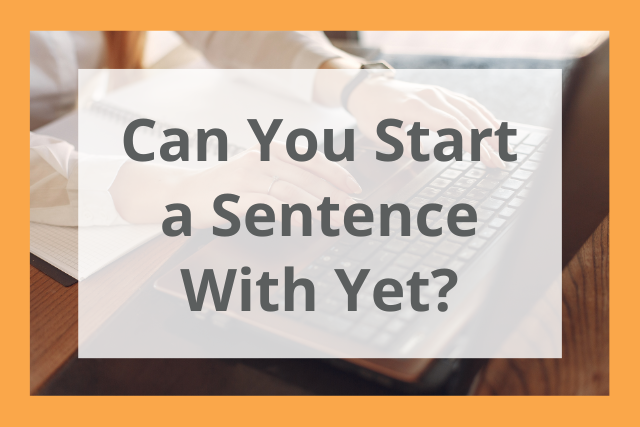
Many people learned in school never to start sentences with words like and, but, or yet.
But writing rules often change over time to match how people actually use the language. This old-fashioned rule about how to start sentences has changed.
So, can you start a sentence with yet? Yes, you can start a sentence with yet. But sometimes, it's better to leave it in the middle of a sentence.
Today, we're learning how to start sentences with conjunctions like yet.
Can Yet Start a Sentence?
To understand how and when to start a sentence with yet, we need to look at the word’s meaning and function.
Yet can be both an adverb and a conjunction in the English language. Yet mostly functions as a conjunction when it starts sentences.
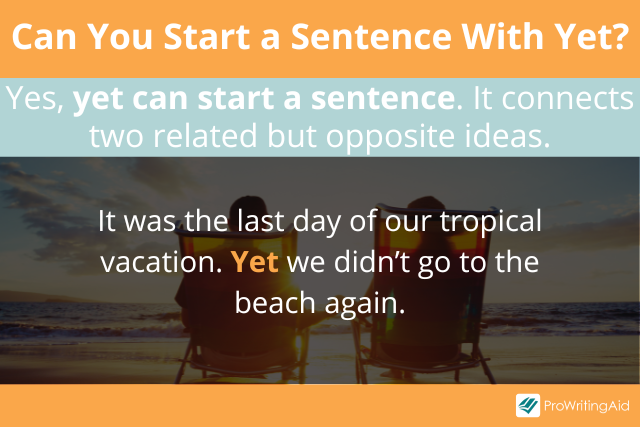
The definition of the yet conjunction is "nevertheless, though, or still." It often acts like the conjunction "but" in sentences.
Yet is one of seven coordinating conjunctions in English. A coordinating conjunction is a word that joins two independent clauses. Independent clauses are complete thoughts that can stand on their own as complete sentences.
When you start a sentence with yet, it will be the second of two related sentences. Because it means "but" or "nevertheless," yet introduces an idea that is contrary to the preceding sentence.
Let's look at an example:
- It was the last day of our tropical vacation. Yet we didn't go to the beach again.
Yet joins these two topically related sentences. The sentence that begins with yet is related to and states something in contrast to the first sentence. If you replaced yet with "but" or "nevertheless," it would still make sense.
Deciding whether to use yet in separate sentences vs one sentence is a stylistic choice, and both are usually correct. For example, you might choose to separate your independent clauses when one of them is lengthy in order to improve readability.
Rarely, the adverb form of yet will begin a sentence. In this case, there does not need to be a related preceding sentence. Here's an example:
- Yet another spam account followed me on Instagram.
Yet refers to "another spam account" and implies that there have been many. But this is not a grammatical pattern we use very often in English.
How to Punctuate Yet in a Sentence
Grammar rules around yet get even more confusing when you add in punctuation. Where do you put commas when you use yet in a sentence?
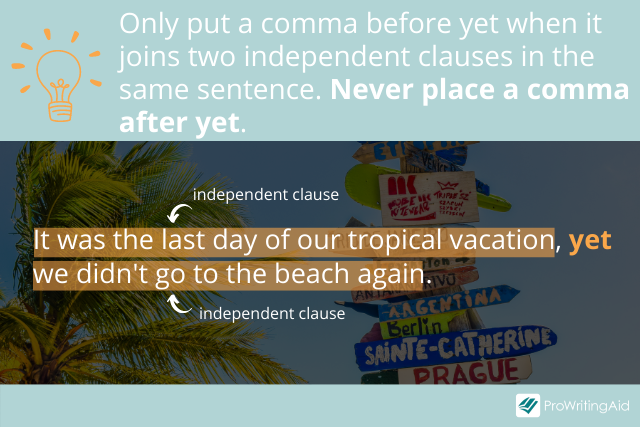
When a sentence begins with yet, we do not need to put a comma before or after it. This applies to both the conjunction and adverb forms of yet.
When you use yet to join two clauses in one sentence as a coordinating conjunction, you should place a comma before yet. This applies to all coordinating conjunction words. Let's see what this looks like using our previous example:
- It was the last day of our tropical vacation, yet we didn't go to the beach again.
Any other time yet appears in a sentence as an adverb, no comma is necessary. Yet will often join words that describe a noun or pronoun. Sometimes it also refers to a point in time.
- The toddler was tiny yet strong.
- Are we at the cabin yet?
In summary, only use a comma before yet when it combines two independent clauses in the same sentence.
Comma rules can be confusing, but you don’t have to remember all of them. You can use ProWritingAid’s grammar checker to ensure you never miss a comma.
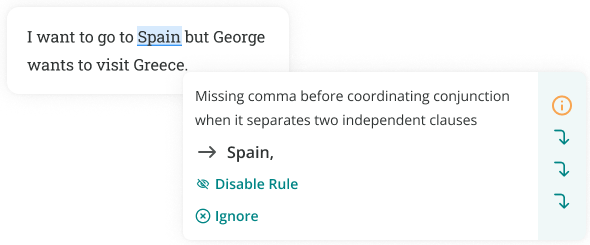
When to Use Yet in a Sentence
You can use yet when you need a coordinating conjunction that is similar to "but." If you find yourself using "nevertheless," yet is a good substitute to improve readability. It’s a shorter word and sounds less verbose than its synonyms.
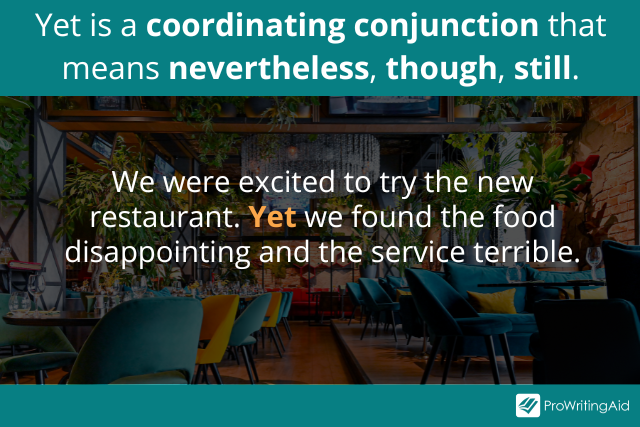
As an adverb, use yet to compare two opposing adjectives or to refer to a specific point in time.
Examples of Yet at the Beginning of a Sentence
Here are some more examples of yet at the beginning of a sentence:
- We were excited to try the new restaurant. Yet we found the food disappointing and the service terrible.
- The company spent a massive amount of money on a social-media ad campaign. Yet they barely saw any increase in sales.
- The family prepared extensively for the winter storm. Yet they still ran out of firewood too soon.
- Paula left detailed instructions for the babysitter that outlined every possible scenario of what could go wrong. Yet she forgot to mention what to feed the kids for dinner.
To recap: you can absolutely use yet to begin a sentence. Yet connects two independent clauses. You do not need to put a comma after yet when it starts a sentence.
Did you learn never to begin sentences with conjunctions when you were in school? Let us know in the comments.


